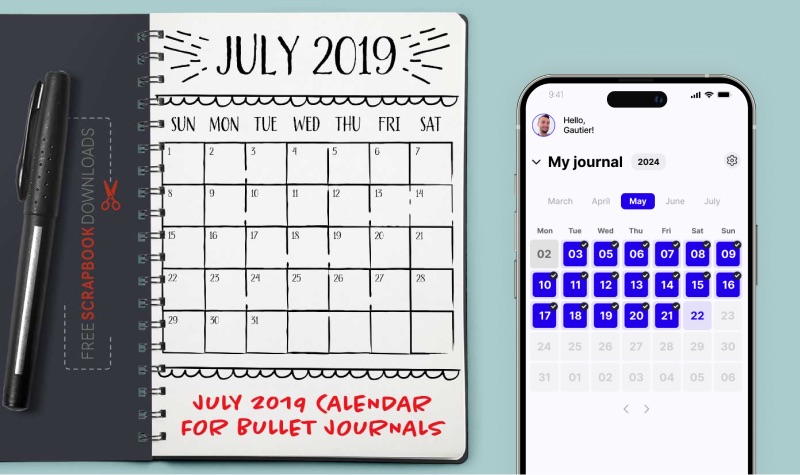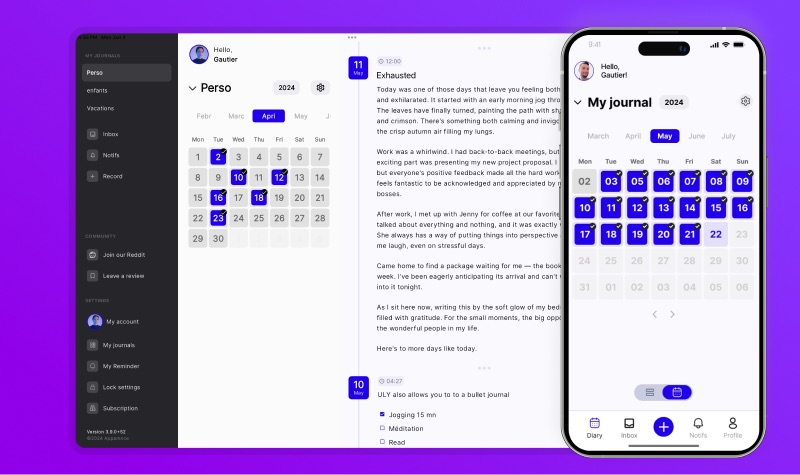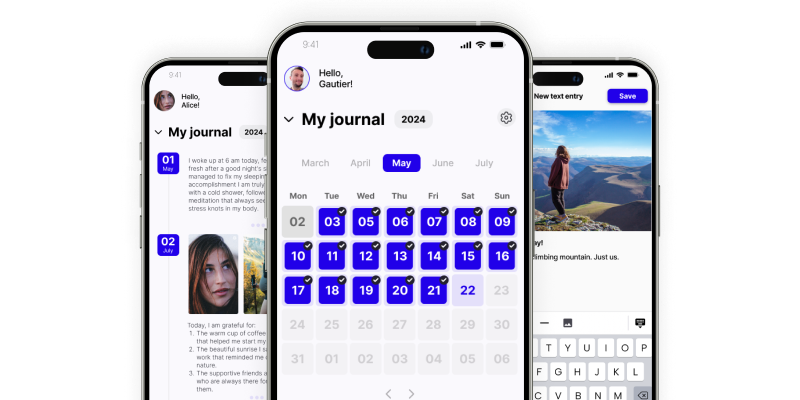Everyone should try a journaling calendar at least once in their life. It's a transformative tool that can help you organize your thoughts, track your progress, and achieve your goals. But what exactly is a journaling calendar, and how can you create one that works for you?
In this guide, we'll explore the benefits of a journaling calendar, how to set one up, and how to make the most of it for personal growth and productivity. A journaling calendar is more than just a tool. it's your personal assistant for life management. It beautifully intertwines the utility of a bullet journal, the forward-planning capability of a monthly calendar, and the introspective depth of a daily log.
This trifecta ensures you have everything you need in one streamlined, easy-to-use platform.
In the following sections, we'll guide you through setting up your very own journaling calendar, mastering its use for maximum effect, and tackling any hurdles you might encounter along the way.
Moreover, we'll share motivational stories and practical advice from individuals who have already embraced the journaling calendar lifestyle. By the time you're done reading, you'll be fully equipped to embark on your journaling calendar adventure, paving the way to a more organized, fulfilled, and improved life.
What is a Journaling Calendar?
A journaling calendar is a versatile tool that combines the functionality of a calendar with the expressive freedom of a journal. It allows you to reflect on your daily experiences, track your habits, set goals, and plan your future, all within a single, cohesive system.

It motivates you to write daily in your journal. The calendar will help you track your progress, set goals, and reflect on your experiences.
Creating Your Journaling Calendar: A Step-by-Step Guide
Choosing the Right Calendar for You
The initial step is selecting the ideal calendar type.
Options are plentiful, ranging from digital apps to physical planners. But the most effective one is definitely digital apps.
Digital apps can now be accessed on your phone, tablet, or computer, ensuring you have your journaling calendar with you wherever you go. Also they offer a security and privacy features that physical planners can't provide.
Here is an example of a digital journaling calendar with ULY app:

Setting up your goals
Once you've chosen your calendar, it's time to set up your goals.
One of the benefits of a journaling calendar is that it allows you to track your progress towards your goals.
Set one or 3 long term goal: This is your ultimate objective, something you want to achieve in the future. It could be a career milestone, a personal accomplishment, or a lifestyle change. Then break down your long term goal into smaller, more manageable task or habits that you can track daily or weekly.
Each day, you can mark off the tasks or habits you've completed, giving you a visual representation of your progress.
Each day reflect on your progress and actions taken towards your goals. So you can adjust your plan if needed. But you know that you are on the right track.
✅ If your actions are aligned with your goals, you will achieve them. Writing down will help you to remember them and keep you motivated.
A small action every day will lead you to your long term goal.
Maximizing Your Journaling Calendar for Full Potential
How can this tool be transformed into a catalyst for personal development and joy? We're here to offer tips and strategies to help you utilize your journaling calendar to its fullest extent.
Daily Review and Reflection Practices
Engaging with your journaling calendar on a daily basis for review and reflection is paramount. This routine aids in aligning with your goals, assessing your growth, and deriving lessons from daily occurrences.
Consider these practices for an effective daily reflection:
👉 Conclude each day by marking off accomplished tasks and habits on your journaling calendar. Celebrate your successes and recognize any obstacles you faced.
👉 Journal your thoughts and emotions about the day. Reflect on your learnings, what brought you joy, any challenges you encountered, and your coping strategies.
👉 Express gratitude for the day. Acknowledge what and who you’re thankful for, and explore how you showed appreciation.
👉 Set goals and intentions for the following day. Define your objectives, desired emotions, and outline the steps needed to achieve them.
This practice enhances personal growth, provides valuable insights, and fosters a positive mindset. Moreover, it allows for the adjustment of plans and setting a foundation for future success.
Identifying Trends and Patterns
Utilizing your journaling calendar to spot trends and patterns in your life can unlock insights into your habits and preferences. This awareness facilitates optimization of both performance and overall well-being.
Steps for identifying trends and patterns:
👉 Each week, month, or quarter, analyze your journaling calendar for recurring themes, patterns, and notable correlations.
👉 Probe deeper by asking questions like how your mood influenced your productivity, the impact of your habits on your objectives, and the effects of events on your emotions.
👉 Formulate conclusions and action points based on your analysis. Identify your strengths, weaknesses, opportunities, threats, and lessons learned.
Through analysis and identification, you obtain a deeper self-understanding, enabling informed decisions and effective problem-solving. It also positions you to leverage your strengths and address your weaknesses proactively.
Sharing and Accountability
Another effective approach is sharing your journaling journey and engaging in accountability partnerships. This fosters motivation, inspiration, and support, enriching your journaling experience.
For sharing and accountability, follow these steps:
👉 Connect with a journaling companion, mentor, coach, or a group that shares your interests and aspirations. Online communities dedicated to journaling and personal development are also valuable resources. You can for example join the subrredits r/ULY, r/digitalJournaling...
👉 Through sharing and accountability practices, you enhance your confidence, creativity, and joy. Moreover, you forge meaningful connections, broaden your network, and grow alongside others.
Troubleshooting Common Journaling Calendar Challenges
Journaling calendars are instrumental for boosting productivity and fostering self-growth, yet they're not without their hurdles. Here, we delve into some prevalent challenges and offer actionable solutions to navigate through them effectively.
Overcoming the Blank Page Syndrome
Confronting a blank page can feel intimidating, leaving many feeling stuck or uninspired. Below are strategies to combat this issue:
👉 Begin with a word list. To conquer the blank page, start adding content immediately. Draft a list of topics, themes, or emotions you're interested in exploring. This initial step can spur ideas and get the creative juices flowing.
👉 Establish a routine. A consistent writing schedule can ease the anxiety associated with journaling. Pick a specific time, location, and duration for your sessions, and try to adhere to it. Incorporating mood setters like music, candles, or a cup of tea can signal it's time to write.
👉 Set a timer. Overcome writing apprehensions and procrastination by using a timer. Commit to writing for a set period, such as 10 minutes, or try the Pomodoro technique—write for 25 minutes, then break for 5 minutes, and repeat.
👉 Vary your starting point. If beginning to write is daunting, change where you start. Write the middle or conclusion first, or use a prompt, question, or quote to kickstart your entry.
👉 Reframe your perspective on writing. Instead of viewing writing as a chore or obligation, consider it a privilege or a playful act. Reminding yourself of the benefits and purposes of journaling can shift your attitude and make the process more enjoyable.
👉 Embrace imperfection. Remember, your journal entries don't have to be masterpieces. Focus on writing for yourself, without concern for grammar, spelling, or structure. Enjoyment of the process is key.
Staying Consistent
Maintaining regularity in journaling is a common challenge. Here are techniques to ensure consistency:
👉 Define your journaling purpose.
Understanding why you journal can keep you motivated and dedicated. Reflect on the benefits you wish to gain and the goals you aim to achieve.
👉 Select an area of focus.
Keeping engaged with your journaling can be easier when focusing on an urgent matter or an appealing subject. This can maintain your curiosity and enthusiasm.
👉 Find your journaling style.
Explore different journaling methods and formats to discover what feels most natural and fulfilling for you.
👉 Start small.
Commit to writing just one line a day to build consistency without feeling overwhelmed. This can be a simple reflection of your day's experience.
👉 Incorporate journaling into your morning routine.
Using your journal to set daily intentions or express gratitude can make journaling a foundational part of your day.
👉 Make it a bedtime ritual.
Reflect on your day and plan for tomorrow by journaling each night, helping to integrate this practice into your evening routine.
👉 Leverage prompts.
Prompts can provide direction and inspiration, keeping your journaling practice vibrant and engaging.
👉 Try a five-minute journal.
Idea of a five-minute journal is to write down 3 things you are grateful for, 3 things that would make today great and a daily affirmation.
Adapting Your Journaling Practice as Your Life Changes
Life's constant changes necessitate adjustments in how we journal. Here are some tips to accommodate evolving circumstances:
- Document the change. Write about the events, emotions, and outcomes associated with significant life changes. This helps in processing and understanding these transitions.
- Embrace change. View changes as opportunities for growth and document the positive aspects and potential benefits these changes bring to your life.
- Journal with peers. Sharing your journaling journey with others who are experiencing similar changes can offer support and valuable insights.
Transform Your Life with a Journaling Calendar
In this informative piece, we've explored the process of creating and utilizing a journaling calendar. This unique tool not only helps in organizing your daily life but also in tracking habits, achieving goals, and reflecting on personal growth. Additionally, we've addressed common hurdles like overcoming blank page syndrome, maintaining consistency, and adapting to life's inevitable changes.
However, a journaling calendar transcends the functionality of a mere planner or diary. It stands as a pillar of productivity and self-improvement. With its adoption, you're set to enhance your performance, unleash your creativity, and significantly improve your overall well-being, thereby steering your life towards a more positive direction.
Now is the perfect moment to embark on this transformative journey. Secure your journaling calendar and begin your writing adventure today. The outcomes will surely astonish you.







